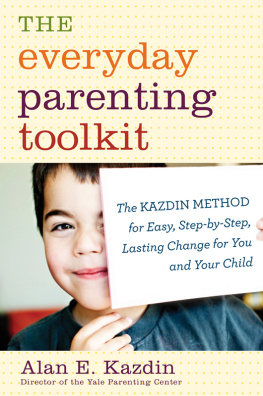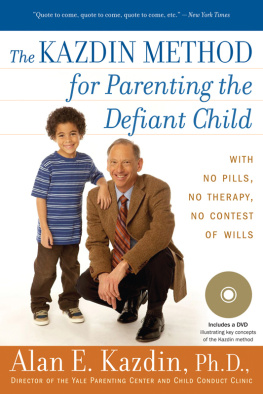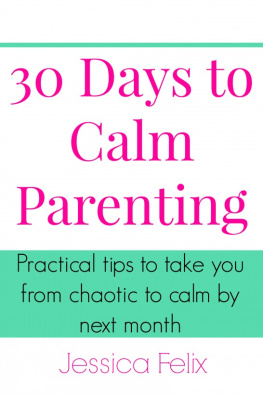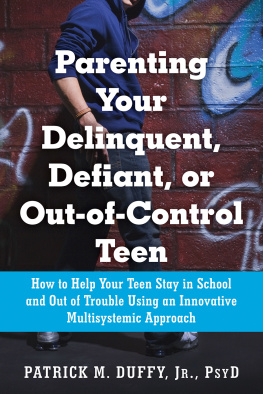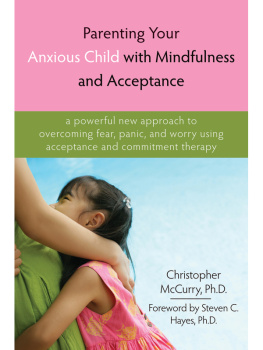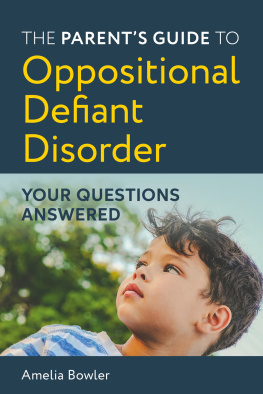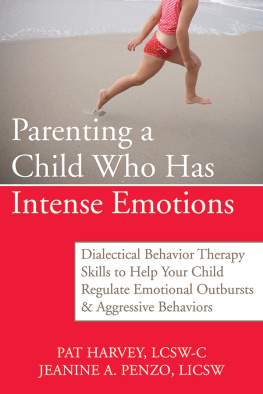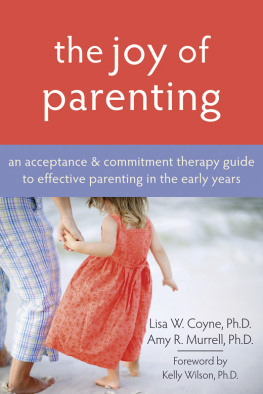Alan E. Kazdin - The Kazdin Method for Parenting the Defiant Child: With No Pills, No Therapy, No Contest of Wills
Here you can read online Alan E. Kazdin - The Kazdin Method for Parenting the Defiant Child: With No Pills, No Therapy, No Contest of Wills full text of the book (entire story) in english for free. Download pdf and epub, get meaning, cover and reviews about this ebook. year: 2008, publisher: Houghton Mifflin Harcourt, genre: Children. Description of the work, (preface) as well as reviews are available. Best literature library LitArk.com created for fans of good reading and offers a wide selection of genres:
Romance novel
Science fiction
Adventure
Detective
Science
History
Home and family
Prose
Art
Politics
Computer
Non-fiction
Religion
Business
Children
Humor
Choose a favorite category and find really read worthwhile books. Enjoy immersion in the world of imagination, feel the emotions of the characters or learn something new for yourself, make an fascinating discovery.
- Book:The Kazdin Method for Parenting the Defiant Child: With No Pills, No Therapy, No Contest of Wills
- Author:
- Publisher:Houghton Mifflin Harcourt
- Genre:
- Year:2008
- Rating:5 / 5
- Favourites:Add to favourites
- Your mark:
- 100
- 1
- 2
- 3
- 4
- 5
The Kazdin Method for Parenting the Defiant Child: With No Pills, No Therapy, No Contest of Wills: summary, description and annotation
We offer to read an annotation, description, summary or preface (depends on what the author of the book "The Kazdin Method for Parenting the Defiant Child: With No Pills, No Therapy, No Contest of Wills" wrote himself). If you haven't found the necessary information about the book — write in the comments, we will try to find it.
Alan E. Kazdin: author's other books
Who wrote The Kazdin Method for Parenting the Defiant Child: With No Pills, No Therapy, No Contest of Wills? Find out the surname, the name of the author of the book and a list of all author's works by series.
The Kazdin Method for Parenting the Defiant Child: With No Pills, No Therapy, No Contest of Wills — read online for free the complete book (whole text) full work
Below is the text of the book, divided by pages. System saving the place of the last page read, allows you to conveniently read the book "The Kazdin Method for Parenting the Defiant Child: With No Pills, No Therapy, No Contest of Wills" online for free, without having to search again every time where you left off. Put a bookmark, and you can go to the page where you finished reading at any time.
Font size:
Interval:
Bookmark:
Copyright 2008 by Alan E. Kazdin and Carlo Rotella
All rights reserved
For information about permission to reproduce selections from this book, write to Permissions, Houghton Mifflin Harcourt Publishing Company, 215 Park Avenue South, New York, New York 10003.
www.hmhbooks.com
The Library of Congress has cataloged the print edition as follows:
Kazdin, Alan E.
The Kazdin method for parenting the defiant child : with no pills, no therapy, no contest of wills / Alan E. Kazdin ; with Carlo Rotella.
p. cm.
Includes index.
ISBN -13: 978-0-618-77367-1
ISBN -10: 0-618-77367-3
I. Problem childrenBehavior modification. 2. Child rearing. 3. Parenting. I. Rotella, Carlo, date. II. Title.
HQ 773. K 39 2008
649'.64dc22 2007018303
e ISBN 978-0-547-34824-7
v3.0513
This book is intended to present the research and ideas of its author. If a reader requires personal advice, he or she should consult a competent professional. The author and publisher disclaim liability for any adverse effects resulting directly or indirectly from information contained in this book.
My name may be on the cover of this book, but whats inside is a distillation of many, many peoples work and experience. Science is, almost by definition, a collective enterprise. We advance knowledge by rigorously testing and retesting other investigators ideas and findings, as well as our own. The method I have developed for changing childrens behavior comes out of a rich, complex web of collaborations. In the course of my career, I have worked, directly or by supervising others, with perhaps 6,000 children, 4,000 parents, 5,000 teachers, 3,000 therapists, and scores of fellow scientific investigators, scholars, and clinicians. The National Institute of Mental Health, Rivendell Foundation of America, Robert Wood Johnson Foundation, William T. Grant Foundation, and Leon Lowenstein Foundation, among others, have supported my work with generous grants. Yale University, the Pennsylvania State University, the University of Pittsburgh School of Medicine, and Northwestern University have provided me with good homes, inspired colleagues and students, and welcome support. Vida Health Communications gave my work a new life on video. All of these institutions and individuals have contributed to the development of my method, and thus to this book. I owe them all my heartfelt thanks, and I owe special thanks in particular to the superb clinical staff at the Yale Parenting Center and Child Conduct Clinic. To protect the privacy of parents and children, in this book I have changed and invented names and identifying characteristics.
Your four-year-olds tantrums have become more frequent and intense; they have started to dominate the life of your household. Hes not just yelling and screaming anymorenow he throws things, hits, and kicks, too. The bedtime tantrum is the most predictable one, and the one that disrupts home life the most, but he has also taken his show on the road. Youve been late to work recently because he melts down in the morning when you leave him at daycare. After other spectacular public performances at the supermarket, restaurants, and family gatherings, none of which you handled very well, you are sure that others see you as an incompetent parentand you are starting to wonder if they might be right. And, deeper than that, it frightens you to feel the situation slipping beyond your control. Youre losing your confidence that you can govern your child, your household, and when you lose your temper, yourself.
***
You want your nine-year-old to work with you, not against you. Youre not asking for blind compliance, but more cooperation would be nice. Right now, she seems to fight you every step of the way, from getting up for school in the morning through homework and dinner and computer or TV time. Sometimes she insists on complete freedom and autonomy; sometimes she acts as if you have to do everything for her. She bickers incessantly with her sister, too. Is it asking too much for you to have a little peace around the house? Youre tired of laying down the law, trying to understand her point of view, and using every other strategy that hasnt worked. Frankly, you are fed up with your own child. You find yourself wistfully wondering why you werent one of the lucky ones who got a nice, easy kid to raise.
***
Your thirteen-year-old gives you nothing but attitude. On a couple of occasions, he has stolen something or committed an act of vandalism, the most worrisome pieces of a larger pattern of defying authority. You tell yourself that hes going through a phase, that hes just a normal preadolescent, but you fear that he may be heading toward serious trouble. You have tried to talk to him in every way you can think ofpunishing, explaining, begging, cryingbut nothing works. Your spouse says you are exaggerating, but you feel its time to face the seriousness of whats happening to your family. Your child has a good heart, but that doesnt keep you from feeling always a little on edge, not knowing when the next crisis will develop.
***
Should you be addressing these problems now, before they lead to more serious ones? Or should you wait to see if a particular problem resolves itself? Perhaps youve gone online, Googled tantrum or defiant child, and found that your childs behavior fits a diresounding label. Perhaps youre more concerned than your spouse is, or vice versa, and its becoming a bone of contention between youtwo devoted parents who find themselves disagreeing about whats wrong, how serious it is, how to put it right, or whether to try to fix it at all.
The tangle of confusion, frustration, fear, and anger inside you turns spending time with your child into a wearisome, long-running confrontation, even a chore that you secretly dread, and that feels very wrong to you. Youve become a character you dont really recognize, or recognize all too well as the kind of parent you never wanted to be: a frequently irate, sometimes out-of-control shouter who spends altogether too much time ineffectively nagging, threatening, punishing, and even hitting the very child you love as much as you have ever loved or could ever love anyone. You feel off-balance, strange to yourself. You need a better way to be a parent, but you havent gotten much useful help from the models you may have turned to: the way your parents, bless their hearts, did it; the many ways the child-rearing manuals suggest you do it; the way Supernanny does it on TV. With professional experts of all kinds promising that their way works, with friends and friends of friends telling you stories about how so-and-sos kid was turned around by a new parental strategy or miracle diet or whatever, its hard to figure out what actually will work for you and your child.
There is a way to establish what actually does work. Its called science. To most people as they go about their daily lives, science means subjects such as the discovery of water on Mars, how birds spread influenza, and what trans fats do to our bodies. All of these are important and consistently newsworthy, without doubt, but science has also been quietly pressing forward in the effort to understand child development, child-rearing, parent-child interaction, and all sorts of other matters that affect your childs social, emotional, and behavioral adjustment.
Within the extensive research on human behavior in general, a great deal tells us specifically about the behavior of children. You may be surprised to hear that scientists have studied the most effective way to give a command to a child, or that they have rigorously compared the effectiveness of rewarding good behavior and punishing misbehavior. There are even studies that tell us very specific things like, for instance, the most effective way to speak to a child when asking her to do something shed prefer not to do: brush her teeth, wear a jacket, get off the phone, or go to bed on time. Obviously, very few parents have the time or training to get up to speed on the latest research in psychology, not to mention child development and neurobiology and all the many related fields. But they can benefit profoundly from what researchers have discovered.
Next pageFont size:
Interval:
Bookmark:
Similar books «The Kazdin Method for Parenting the Defiant Child: With No Pills, No Therapy, No Contest of Wills»
Look at similar books to The Kazdin Method for Parenting the Defiant Child: With No Pills, No Therapy, No Contest of Wills. We have selected literature similar in name and meaning in the hope of providing readers with more options to find new, interesting, not yet read works.
Discussion, reviews of the book The Kazdin Method for Parenting the Defiant Child: With No Pills, No Therapy, No Contest of Wills and just readers' own opinions. Leave your comments, write what you think about the work, its meaning or the main characters. Specify what exactly you liked and what you didn't like, and why you think so.

